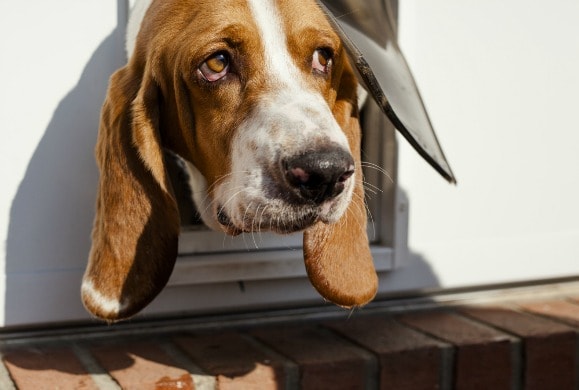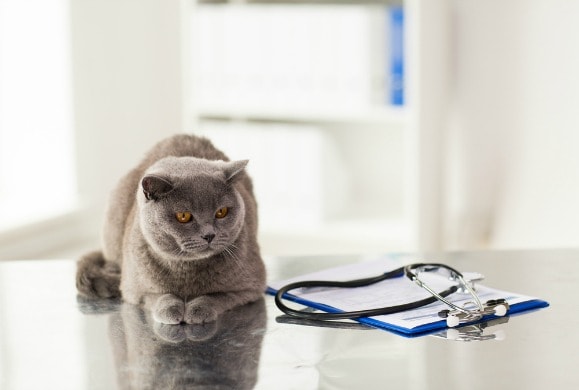Animals Too Tired to Care

Causes of Pet Lethargy
By John Gilpatrick
The average dog sleeps upwards of 10 hours per day, while most cats clock a solid 12 hours of shut-eye, meaning that in a given day, there's a 50-50 chance your pet is sleeping whenever you see them.
Though most pets spend the rest of their hours playing, eating and walking, a lot of the time, they're likely just sitting around. Even healthy dogs and cats can appear lethargic, according to Boston Veterinary Clinic owner Dr. Brian Bourquin, any increased signs of inactivity in your pet can be indicative of a larger problem. "You know your dog the best," Bourquin said, "and because they can't speak up and say, 'I'm sick!' we have to observe their behavior closely to note any significant changes."
There's often a big difference between relaxed and lethargic. Nancy Williams, an Associate Certified Applied Animal Behaviorist and a Registered Veterinary Technician, said that if your pet isn't eating, doesn't respond when you call them, or no longer feels like playing, walking, or doing the things they normally love to do with you, something larger and potentially problematic could be going on.
Lethargy accompanies a vast majority of canine and feline medical problems, and while they might be small ones, you should immediately consult with your veterinarian as soon you observe excessive lethargy in your animal – anything more than 24 hours, Williams said. Similarly, lethargy can also be a symptom of many behavioral problems in pets.
Read on for five of the most common reasons for pet lethargy:
Image: Chendongshan / Shutterstock

They're Sick
"If your pet is abnormally calm and quiet, you need to think he's sick," Williams says. That doesn't necessarily mean he is sick, but the first step you have to take if your dog is acting lethargic for more than a day is to call the vet.
Then, someone like Williams (a veterinary technician who's trained to listen to a pet owner's concerns) will decide when it's appropriate to bring the pet in for an examination – sometimes immediately, other times in a few days. This depends mostly on other symptoms.
If persistent vomiting or blood in your pet's vomit or stool accompanies the lethargy, that's extremely concerning, she said. If he skips one meal, it might just be because he's hot, but anything more than a single missed meal and you might be dealing with a major medical issue like heartworm disease, kennel cough, problems with the heart or liver, diabetes, or tumors. The sooner these are diagnosed, the likelier your dog is to recover, so don't hesitate if you notice something off.
Image: Igor Normann / Shutterstock

They're Frightened of Something
Williams said that many of the calls she's received from pet owners concerned about their animal's apparent lethargy were from brand new adopters. "One of the first questions I always ask is, 'How long have you had your pet?'" she said.
Dogs and cats living in a new home for the first time can and probably will be a little frightened at first. This doesn't mean you shouldn't still call, but try spending a little more time than you might otherwise with this animal. As he adjusts to you and the new surroundings, you might find he perks up and lets his personality shine.
New surroundings aren't the only fear that can cause a pet to act lethargically. Williams said that loud noises like fireworks, smoke alarms and gun shots as possible triggers for behavioral lethargy and while in many of these cases the symptoms are acute (come on immediately and are short-lasting), other times they persist and need to be looked at by a professional.
Image: Pashin Georgiy / Shutterstock

There's Been a Major Change in the Household
Bourquin believes that a permanent absence of a loved one – either a human or another animal — can leave a dog or cat feeling depressed and, thus, lethargic. This can last for a few days or, depending on how close the animal was to the deceased, can change behavior long-term.
Williams said, however, that no scientific study has been conducted regarding a link between behavior changes and the absence of a loved one. If your pet is acting lethargically in other cases of absences, like someone in the family leaving for college, it's best to consult with a vet.
Other minor changes in the household, like rearranging a room or switching up where the dog sleeps or eats, should not cause lethargy. "Ask yourself: 'Would a normal animal be distressed by this?' If the answer is 'no,' something is wrong," Williams said.
Image: Dmussman / Shutterstock

They're Reacting Poorly to Medication
This happens with humans all the time, so it stands to reason that prescriptions and other medications can induce side effects that leave animals lethargic, or worse.
Williams said that a lot of medications can cause serious medical problems in dogs and cats, though the only symptom they might be expressing outwardly is lethargy. If you notice a behavior change after introducing a new medication, call your vet immediately.
Image: Syda Productions / Shutterstock

They've Ingested Something Poisonous
This is particularly likely to happen in the summertime if your dog gets into your garage or shed and ingests chemicals from lawn supplies or fertilizers that can be toxic.
Likelier still are things that we can consume without problems that are potentially deadly to dogs, like garlic, onions, and Ibuprofen, Williams said. If you notice a change in your dog's energy level or behavior immediately after cooking something with these ingredients or reaching for the Advil and leaving the bottle out, your pet should be examined by a veterinarian immediately.
Image: Mary Lynn Strand / Shutterstock
Redirection Path
dog/general-health/why-my-dog-lethargic
Additional Slideshows
Source: https://www.petmd.com/dog/slideshows/5-reasons-your-pet-is-lethargic
0 Response to "Animals Too Tired to Care"
Post a Comment